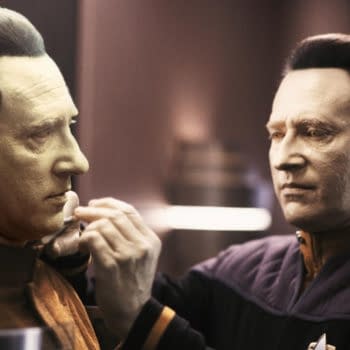Posted in: Books, Movies | Tagged: books, dan brown, entertainment, HRL, origin, Robert Langdon, tom hanks
Origin Review: Robert Langdon Goes Sci-Fi In Dan Brown's Newest Novel
Dan Brown is an interesting author. He is best known for his Robert Langdon novels about a Harvard University professor of religious iconology and symbology (a made-up field of study). His knowledge ends up getting him pulled into five different life-or-death situations so far, all of which end up with religion being a major factor. The most famous of the novels is the second in the series, The Da Vinci Code.
Langdon is a unique protagonist more in the style of an Alfred Hitchcock character than, say, Jason Bourne. He's a quirky academic with eidetic memory, a Mickey Mouse watch, and crippling claustrophobia. When it came time to cast Langdon on film, they went to our generation's "everyman", Tom Hanks. Three of the five books in the series have been turned into films: The Da Vinci Code, Angels & Demons, and the most recent film, Inferno.

It revolves around a former student and close friend, Edmond Kirsch, a 40-year-old tech genius billionaire that has made a world-changing discovery that answers the two greatest questions man has ever asked: "Where did we come from?" and "Where are we going?" Kirsch claims to have found the answer and is presenting it at the Guggenheim Museum Bilbao when he is killed by an assassin, who is working for sect of the Catholic church called the Palmarian Church. They even have their own Pope.
The woman involved is Ambra Vidal, the curator of the Guggenheim, who helped Edmond put together the presentation. She's currently engaged to Prince Julian of Spain (and the King is on his deathbed). Kirsch invites Langdon to the presentation and even includes one of his old professor's lectures as part of it. But his actual discovery is not revealed due to his death. Fearing that this was a move by the church to keep the discovery from happening, Langdon and Vidal head out on a quest to release the information to the world. Aiding them is one of Edmond's greatest creations, an artificial intelligence named Winston.
Brown may use a basic formula for his books, but what makes them interesting — and even bestsellers — is what he fills them in with. Making a house starts with a basic framework, but how you decorate it is what makes it a home. Brown's books are the same thing. Whether he is trying to find the Holy Grail, taking on the history of the Knights Templar, or trying to stop a man-made plague, Langdon is a hero because of his heart and his mind. But a shift has taken place in the series. Where the first three seemed to focus on the past and secrets, the last two books have focused more on the future and society. In Origin, you have a true battle between science and religion that shines a light on the real world's constantly growing and evolving technology and how it's connected to those that use it.
Brown crafts a tale that hits on the notes you expect — religion, zealotry, conspiracy — and represents all sides with both positive and negative examples. For every bad man with a bible, there is a good man with a bible… and for every bad man with a science degree, there is a good man with a science degree. But at a certain point, the book quietly shifts into the science-fiction realm. It does this so subtly that you don't really notice until you look back. And even then it's hard to distinguish, because current technology seems to be advancing at such a pace that the story could happen tomorrow.
Brown's novels are often cited as being an attack on religion. Having read all five, I would counter that they aren't an attack — but neither do they keep up the illusion. Brown never tries to tell people what to believe, nor does he try to take a side on the existence of God. In an argument that man came to be through the laws of physics, Langdon is the one to ask what created the laws of physics. Through Langdon and his stories, Brown presents a historical take on religion and government, how they are intertwined, and as organizations run by men, how they can be corrupted. He often seems to take the approach that religion and science can coexist and thrive.
Origin is a good read, entertaining, and full of new things to learn. Definitely the best in the series since The Da Vinci Code.














